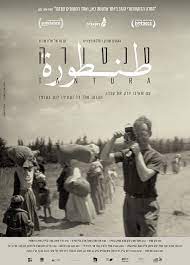
TANTURA
Israel, 2022, 96 minutes, Colour.
Teddy Katz.
Directed by Alon Schwarz.
Tantura is an Israeli film focusing on a massacre of Palestinians in 1948, the perspective of Israel and the war of liberation and the establishment of the state of Israel – in contrast with the Palestinians who consider it The Catastrophe, Nakba.
This is a documentary, mainly talking heads, but always interesting, taking the audience back to the Palestinian village in 1948 and the testimonies, but also a focus on investigations to uncover truth, and the reluctance of government and some academics to face the truth or, when there is expose, to deny it and to condemn the investigator.
"Tantura" is an ensemble work with a lot of voices. But the main narrative thread is research by a Haifa University graduate student named Teddy Katz about the effect of the 1948 war on five villages, including Tantura. Katz conducted 140 hours of audio interviews with 135 people, both Palestinians and Israeli witnesses to (and participants in) the events at Tantura. Then he published a thesis in 1998 concluding that there was a massacre of 200-250 Tantura Palestinians, mostly men, by IDF’s Alexandroni Brigade, and that the victims were buried in mass graves. He received the highest grade possible on a thesis and graduated with honors. This paragraph from Roger Ebert.com, writer, Matt Zoller Seitz.
The subject of the film is rather daring for an Israeli director, Alon Schwartz. Israeli authorities, in fact, wanted the film banned from screenings. However, it was a nominee for the Awards of the Israeli Film Academy, 2022, won the research award at the DocAviv Festival, was in competition at the Sundance Festival, screened at festivals in Cleveland and winning at Philadelphia.
While the testimonies and the speeches are always interesting, there is the focus on the researcher, Teddy Katz, who interviewed 135 witnesses, some willing to remember, some unwilling to remember, many contradictions in the testimonies. However, Katz was able to draw conclusions in considering the consistencies and inconsistencies of the testimonies. When his work was published, the Rector of the University of Haifa dismissed it as unreliable and some of the witnesses began proceeding against Katz. Katz at first signed a document condemning his thesis but later retracted. The Rector appears in this film, spurning the work of Katz.
This kind of film, testimony, interviews of witnesses, is always a challenge to the collective memory of Israel, the joy of the establishment of the state of Israel, the withdrawal of the British occupation, the situation of the Palestinians in their villages and their being evicted, the decades of hostilities, Israel’s wars, and the continued discussions about the two states. Nakba is considered to boo in Israeli society.
A Jordanian film about the Nakba and a massacre in a Palestinian village in 1948, Farha, serves as a companion piece to this film (and was subject to Israeli complaints to Netflix, wanting them to withdraw the film).